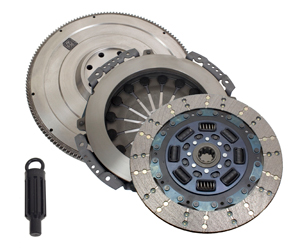Clutch Repair
Some auto repairs can be handled by the adventurous owner with the appropriate auto repair manual and a little elbow grease, but replacing or repairing a clutch isn’t one of them. Most experts recommend taking big jobs like clutch repair to a qualified mechanic in the first place instead of having to call one to fix the damage done by a botched amateur repair job.
Clutch Problems
Clutch problems with older cars and trucks can often occur between 50,000 and 70,000 miles, but hard driving or heavy loads can cut that number in half. What usually goes first on a clutch is the friction material on the disc. This causes the clutch to start slipping and eventually it won’t transmit power from the engine to the wheels.

The opposite problem is sticking. The clutch doesn’t release properly and continues to turn the input shaft, causing grinding or preventing the transmission from going into gear. According to the article, “How Clutches Work.” by Karim Nice and Charles Bryant, the leading causes of sticking are:
- Broken or stretched clutch cable – The cable needs the right amount of tension to push and pull effectively.
- Leaky or defective slave and/or master clutch cylinders – Leaks keep the cylinders from building the necessary amount of pressure.
- Air in the hydraulic line – Air affects the hydraulics by taking up space the fluid needs to build pressure.
- Misadjusted linkage – When your foot hits the pedal, the linkage transmits the wrong amount of force.
- Mismatched clutch components – Not all aftermarket parts work with your clutch.
No matter the problem, a trained mechanic will have the specialized tools for clutch repair and the experience to know when the clutch needs to be replaced instead. Grant Houston, the owner and chief mechanic at Denver Transmission has more than 25 years of experience fixing transmissions, drive trains and all their components. Free estimates provided upon request.
